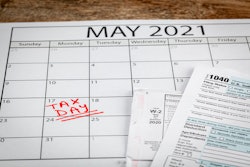Since the Overdrive‘s GATS Week virtual session I participated in during late August, I’ve been reflecting on income taxes. Some owners put so much focus on not paying taxes instead of maximizing profit for their business, which can lead to bad decisions. It seems we all hate to pay taxes, viewing them as a stressful draining of our finances. We have trouble believing we receive any return from paying them.
Taxes provoke anxiety, for sure, but why? One theory: We don’t see income taxes as a bill that will come due.
It’s not the truck payment or the fuel purchase — you know you need fuel, and there’s an immediate gratification from receiving something in return for your money on both counts when you turn that key and the engine roars to life.
Taxes, however, feel as if little more than a distraction. An unknown amount of money that you struggle to predict, it’s the bill you don’t receive an invoice for. And even with the quarterly estimated amounts due, forwarded by your tax preparer with the coupon to mail with a check, these can be tucked away in a file folder and ignored until you receive next year’s tax bill from the preparer. Getting out of the willful ignorance (of sorts) mindset can help you manage taxes, and perhaps improve outcomes. If you let taxes be a psychological and behavioral manipulator, they’ll interfere with more logical decision-making throughout your business.

If you have previous work experience as an employee, think back to your paycheck. Did you ever pay much attention to the FICA taxes deducted? The dollars most of us focused on were the amounts on the checks, what we were free to spend as wished. Come April 15, most people get more excited about their tax refund and what to spend this on, perhaps a big screen TV or a newer car. That amount they knew, but many employees don’t even know what they paid in taxes.
As a small business owner, everything is different. As new owners collect their first receivables or settlements, the figures often appear huge compared to their previous-employment paychecks since, among other things, no taxes are deducted.
Too many go on a spending spree before they realize they’ll have a tax bill due, neglecting any estimated quarterly tax that first year. That sets in motion a habit for the long run that can be detrimental when managing this part of a small business.
I’ll never advocate that you should pay more tax that you owe, but I encourage you to take a longer view. Go back to last year’s tax filing and find how much you earned and how much you paid in taxes. You might be surprised that your tax bill as a percentage of earnings is lower than you thought.
At whatever stage you sit with your business — the earlier the better — get together with your certified tax preparer and also find a certified financial planner. Work with them to develop tax and financial plans. When I started my trucking business, I asked my tax preparer how much I needed to save for taxes. The response, after I answered a few questions, was simple: Save $1,000 a month to begin with.
Even with depreciation on my truck purchase at that time, this amount was nearly spot-on. My wife Marcia and I put the practice in motion until it became habit, adjusting when the need arose. Over the years, we were never stressed in any outsize way when we had taxes due quarterly and annually.
I’m not against buying equipment if it makes sense for profit. Continually investing in equipment, a depreciating asset, can be a way to avoid paying much tax. Yet if avoiding taxes is the principal reason you’re buying, think again. If you’re not paying taxes, it could be that you’re not making much money, either.
Calculate the long-term return on investment for any equipment purchase. Factor in the possibility, with equipment payoff, of growing your savings and potentially investing in other diversified assets that have growth potential, in addition to your trucking business. This is an especially important consideration as you approach the sunset of your career as a truck business owner.
Remember, it’s important to have an exit plan, and to understand all of its consequences. For example, this year I sold my truck, which had been depreciated to zero since 2008. I may owe 25% of the selling price as income taxes. This is something I prepared for by calling my tax preparer, learning what I should save for that expense.










